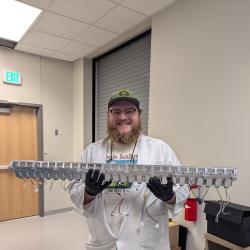PSC Strengthens NIST Partnership - Katharine Gebbie Advocated for JQI and New Facility
Katharine Gebbie, a founding director of NIST’s Physics Laboratory and Physical Measurement Laboratory who played a major role in the creation of the Joint Quantum Institute (JQI) and the development of the Physical Sciences Complex, is more than pleased to see the project come to fruition. “NIST and UMD have attracted high-caliber scientists to JQI, and will certainly continue to do so with the wonderful new complex,” says Gebbie, who credits former CMNS Dean Steve Halperin and the college’s leadership team with having the vision and management expertise to see the building to completion. “The university’s investment in this facility speaks to its commitment to JQI and the highest level of research.”
Gebbie began her career as an astrophysicist and the first female fellow at JILA, formerly known as the Joint Institute for Laboratory Astrophysics, which is a joint venture between NIST Boulder and the University of Colorado Boulder. She is a strong advocate of university and federal agency partnerships, which can leverage the agency’s mission by providing a critical mass of scientists in any given field. “Through JQI, more scientists are exploring coherent quantum phenomena than either NIST or the university could support on its own,” says Gebbie.
A major force in the field of physics, Gebbie has received many of the nation’s top scientific honors, including the Women in Science and Engineering Lifetime Achievement Award. She is a fellow of the American Academy of Arts and Sciences, the American Association for the Advancement of Science, the American Physical Society and the Washington Academy of Sciences.
Gebbie follows in the footsteps of her accomplished aunt, Katharine Burr Blodgett, the first female to receive a Ph.D. in physics from Cambridge University and the first female researcher at the General Electric Company. A graduate fellowship in physics at UMD in honor of Dr. Blodgett seeks to enhance the diversity of talented students interested in the field of physics. The fellowship was established as “an open fund capable of receiving additional contributions.”







